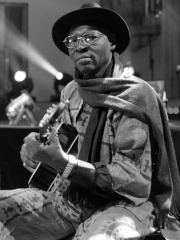
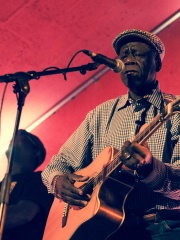
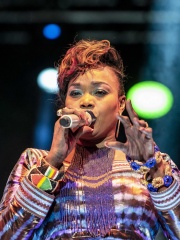
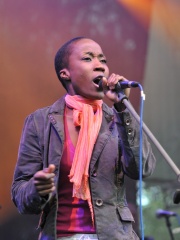

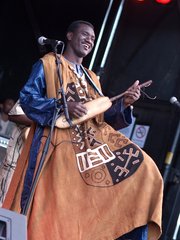
The Most Famous
SINGERS from Mali
This page contains a list of the greatest Malian Singers. The pantheon dataset contains 4,381 Singers, 7 of which were born in Mali. This makes Mali the birth place of the 76th most number of Singers behind Uzbekistan, and Philippines.
Top 7
The following people are considered by Pantheon to be the most legendary Malian Singers of all time. This list of famous Malian Singers is sorted by HPI (Historical Popularity Index), a metric that aggregates information on a biography's online popularity.

1. Ali Farka Touré (1939 - 2006)
With an HPI of 62.89, Ali Farka Touré is the most famous Malian Singer. His biography has been translated into 38 different languages on wikipedia.
Ali Ibrahim "Ali Farka" Touré (31 October 1939 – 6 March 2006) was a Malian singer and multi-instrumentalist, and one of the African continent's most internationally renowned musicians. His music blends traditional Malian music and its derivative, African American blues and is considered a pioneer of African desert blues. Touré was ranked number 76 on Rolling Stone's list of "The 100 Greatest Guitarists of All Time" and number 37 on Spin magazine's "100 Greatest Guitarists of All Time". Some years after his death, a group of musicians playing in his style performed as the Ali Farka Touré Allstars (2012), and later the Ali Farka Touré Band (formed 2014).

2. Boubacar Traoré (b. 1942)
With an HPI of 57.41, Boubacar Traoré is the 2nd most famous Malian Singer. His biography has been translated into 15 different languages.
Boubacar Traoré (born 1942 in Kayes, Mali) is a Malian singer, songwriter, and guitarist.

3. Oumou Sangaré (b. 1968)
With an HPI of 52.17, Oumou Sangaré is the 3rd most famous Malian Singer. Her biography has been translated into 24 different languages.
Oumou Sangaré (Fula: umu sangare; born 25 February 1968) is a Malian Wassoulou singer of Fula descent. She is often referred to as "The Songbird of Wassoulou". Wassoulou is a historical region south of the Niger River, where the music descends from age-old traditional song, often accompanied by a calabash.

4. Rokia Traoré (b. 1974)
With an HPI of 49.48, Rokia Traoré is the 4th most famous Malian Singer. Her biography has been translated into 24 different languages.
Rokia Traoré (born 24. January 1974) is a Malian-born singer, songwriter and guitarist. She made six albums between 1998 and 2016. Bowmboï (2003) won the Critics Award category at the BBC Radio 3 Awards for World Music in 2004 and Tchamantché (2008) won Victoires de la Musique World Music Album of the Year in 2009. Traoré won Best Artist in the Songlines Music Awards in 2009. She is a member of the Bambara ethnic group.

5. Aya Nakamura (b. 1995)
With an HPI of 48.83, Aya Nakamura is the 5th most famous Malian Singer. Her biography has been translated into 37 different languages.
Aya Coco Danioko (born 10 May 1995), known professionally as Aya Nakamura, is a French-Malian singer-songwriter. She began publishing her music online, gaining a following with the songs "Karma" and "J'ai mal". Dembo Camara, a longtime friend, became her producer and manager. Her song "Brisé" garnered traction on YouTube, and a duet with rapper Fababy, "Love d'un voyou", resulted in her charting in France for the first time. She released her debut album, Journal intime, in 2017, followed in 2018 by Nakamura, which was certified diamond in France and has sold more than 1.2 million copies worldwide. The album spawned the hit singles "Djadja" and "Copines" and launched the singer's international career. The same year, she beat the record held by Édith Piaf since 1961 as the most-listened-to francophone woman in the Netherlands. Nakamura has accumulated five number-one songs and a number-one album in France. She was awarded a Victoires de la Musique award for her 2020 album, Aya, which was certified double platinum in 2023, having sold 200,000 copies. She also won an NRJ Music Award and received multiple nominations for the MTV Europe Music Award for Best French Act. Two years after its release, Nakamura surpassed a billion streams on Spotify, making the singer the most-listened-to francophone woman on the platform. On 23 February 2025, the video for Nakamura's single "Djadja" became the fourth French-language song to surpass one billion views on YouTube, behind Indila's "Dernière Danse", Stromae's "Papaoutai", and Willy William's "Ego". She is the first African musician to have a video with over one billion views, and she is the fastest French-speaking artist to reach this milestone in six years.

6. Inna Modja (b. 1984)
With an HPI of 40.96, Inna Modja is the 6th most famous Malian Singer. Her biography has been translated into 21 different languages.
Inna Bocoum, also known as Inna Modja (born May 19, 1984), is a Malian-French female singer and model. "Modja" means "bad, not good" in Fulfulde.

7. Bassekou Kouyate (b. 1966)
With an HPI of 38.90, Bassekou Kouyate is the 7th most famous Malian Singer. His biography has been translated into 14 different languages.
Bassekou Kouyate (born 1966) is a musician from Mali. His band is known as Ngoni ba.
People
Pantheon has 7 people classified as Malian singers born between 1939 and 1995. Of these 7, 6 (85.71%) of them are still alive today. The most famous living Malian singers include Boubacar Traoré, Oumou Sangaré, and Rokia Traoré. The most famous deceased Malian singers include Ali Farka Touré. As of April 2024, 1 new Malian singers have been added to Pantheon including Bassekou Kouyate.
Living Malian Singers
Go to all RankingsBoubacar Traoré
1942 - Present
HPI: 57.41
Oumou Sangaré
1968 - Present
HPI: 52.17
Rokia Traoré
1974 - Present
HPI: 49.48
Aya Nakamura
1995 - Present
HPI: 48.83
Inna Modja
1984 - Present
HPI: 40.96
Bassekou Kouyate
1966 - Present
HPI: 38.90

